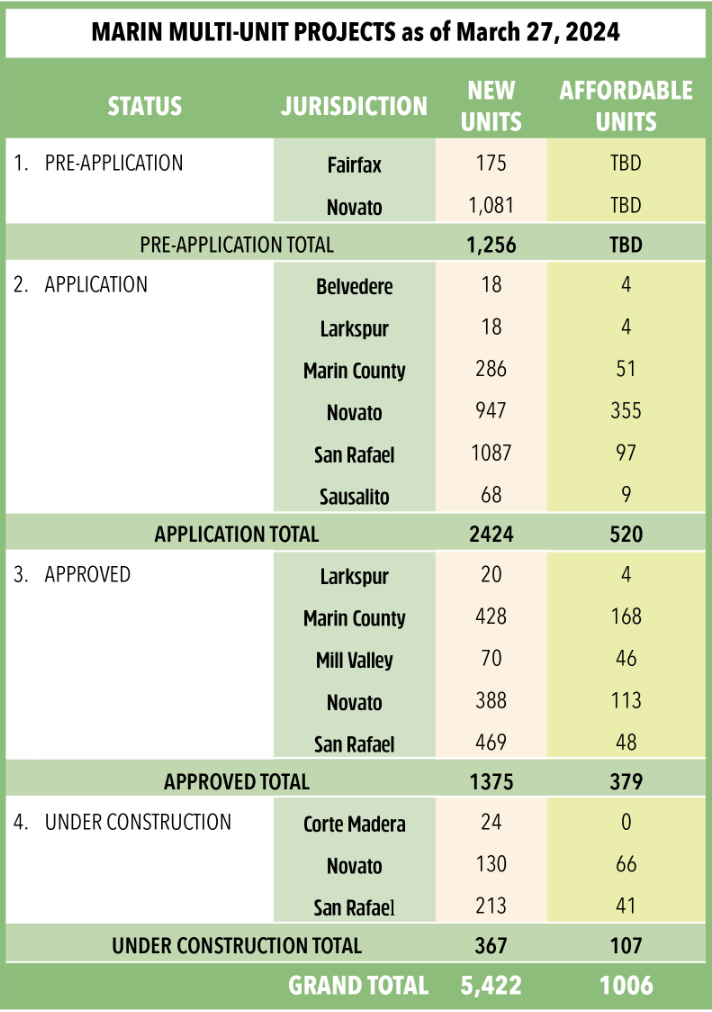A Review of Marin Housing Projects
What’s happening in Marin? A review of active, inactive, and completed housing projects.

| Every day, it seems there is another headline about a housing project. It might feel like we are experiencing a building boom here. But while we are considering some of the largest projects to be built in decades, such as the Northgate Town Center project and Fireman’s Fund, we are not building nearly quickly enough to address our severe housing shortage in Marin. |
| Building boom, really? The journey from project conception to completion is long. Most public attention focuses on the entitlement (or planning) process – the process by which a project is certified to meet zoning codes. Often it includes public hearings and an environmental impact report (EIR). This is often a long and uncertain process. Much of the recent state legislation encouraging housing production has focused on this step. However, this is just one step. Prior to the entitlement process, the developer has typically obtained rights to the land and submitted an application for review. After the land is entitled, the developer usually has two years to get the building permits. The building permits require construction plans which are reviewed by the City/Town to ensure compliance with the building codes. Typically, a developer will secure financing during this period. There are projects that receive entitlements but never move forward, most often because the developer cannot obtain enough financing. Once financing and building permits are obtained, construction can start, and then occupancy. |

| This process is rarely quicker than three years, and in some cases, it can take decades. And projects fall out of the pipeline every step of the way. There are many factors that prevent projects from moving forward that are outside of the planning process. Current higher interest rates have stalled a number of projects. In addition, factors such as the availability of building materials (a big issue right after the pandemic and the Great Recession), labor availability, lawsuits, and challenges meeting permit conditions can all prevent a project from moving forward. Some projects may need permits from multiple governmental agencies, creating additional obstacles. For example, the owner of the C Street Village property is negotiating with the U.S. Navy regarding the release of a covenant limiting residential development of the property. (The property previously hosted an automotive service station.) The status of some applications is unclear. There hasn’t been action on the Eco Pavilions project in Novato since 2020. The City had no further information and the applicant did not respond to our request for information. |
Lots of talk. Little construction.
We have just completed year 1 of our 6th Cycle Housing Element. To be on track to reach our housing goals of 14,405 units, we need 1,801 units each year to receive building permits or certificates of occupancy.
The following table summarizes all the multi-unit projects we are aware of. At first blush, it might appear that we are doing great – 5,600 units are somewhere in the pipeline. However, just because a project is in the pipeline does not mean that it will be built, or even permitted. Some projects are in the application and approval processes for years. This 2018 LA Times article mentions one project with an active application – Seminary at Strawberry. In 2017, it was being considered for 400 units, but that has been reduced to 337. Another project, Marinwood in North San Rafael, died, but is on the County Housing element, and may return. Several Novato projects (Landing Courts, Grant Avenue) are resubmissions of previous projects that were either never approved or never built. There are 4,000 units in the approval process, but only 240 under construction. Four jurisdictions (Fairfax, Ross, San Anselmo and Tiburon) have no active projects at all.
We expect some projects won’t survive the process. Currently in the application phase, there are four projects with 790 affordable units in Novato proposed by an affordable housing developer and the California Housing Defense Fund. These projects used the recently passed legislation, AB 2011. Novato deemed these projects ineligible and incomplete. Legal battles surrounding these applications are likely. Of the approved 1,425 units, at least 489 units are on hold due to lawsuits or lack of financing. We know of another 517 units that were approved (or close) that have now had the projects discontinued.

STATUS DEFINITIONS
1. PRE-APPLICATION: The developer has had public conversations with the jurisdiction but has not submitted an application.
2. APPLICATION: The developer has submitted a preliminary or full application for one or more projects.
3. APPROVED: The project has received its entitlements through the planning process. These projects need to obtain financing and building permits.
4. UNDER CONSTRUCTION. Keep up to date by checking our website projects page.
The table below represents all the projects we included in the count above. Please let us know if we are missing a project or have incorrect information! MEHC is tracking Marin housing data on our website on an ongoing basis. Please check back for the most current info on our projects page.

| O N T H E H O R I Z O N Stuff that’s coming up |
| APRIL 10 — Affordable Housing Bond Explainer WEBINAR — 4 pm Join us for an overview of the affordable housing bond measure that is expected to be on the ballot in November 2024. This bond measure has been referred to as “BAHFA.” We will provide a brief overview of why the bond measure is needed and how it will work. To receive your personalized Zoom link, REGISTER HERE >> APRIL 21 — EARTH DAY MILL VALLEY — 11 am MEHC will be hosting an exhibit at Earth Day Mill Valley, meeting friends and neighbors and sharing info. Get your free tickets here>> to attend this always-fun event. Check out the little video on the registration page! |
 MEHC works for the Marin community MEHC works for the Marin communityMany Marin workers, employers, residents and nonprofits support MEHC’s work to advance environmentally appropriate, culturally sensitive, and socially equitable affordable housing. If that includes you, please consider a tax-deductible donation to MEHC to help us keep working. Your support matters, thank you. |
